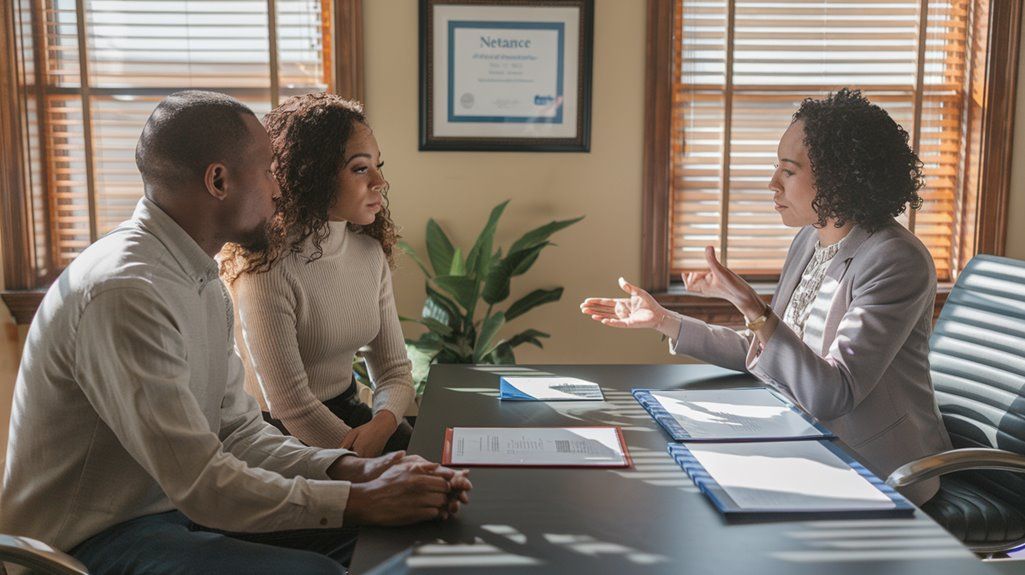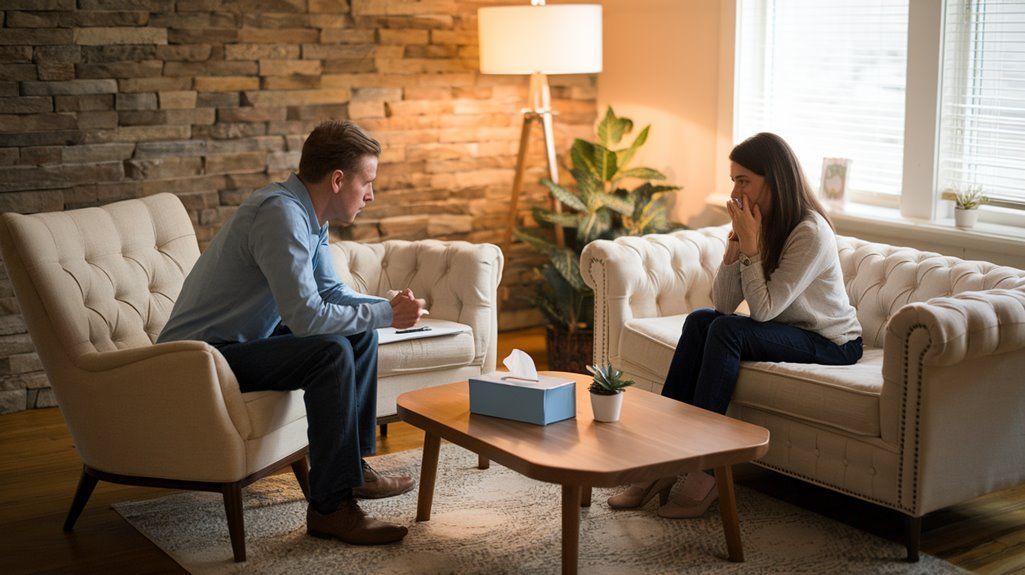How to Create a Safe Emotional Space for Your Partner
Share this article:

Creating a safe emotional space for your partner starts with something you might not be doing: practicing active listening without the intent to reply but to understand. It's about hearing beyond the words, recognizing the emotions, and the unspoken messages they're conveying.
When you actively listen, you're not just waiting for your turn to speak; you're providing a foundation of trust and empathy. This is crucial, yet often overlooked, in building a nurturing environment for your partner.
If you're wondering how to elevate this practice and truly make a difference in your relationship, consider the next steps we're about to explore.
Key Takeaways
- Practice active listening and encourage open dialogue to deepen connection and trust.
- Offer unconditional support to foster a secure and empowering relationship.
- Respect your partner's boundaries to nurture trust and individuality.
- Cultivate empathy by understanding and sharing your partner's feelings without judgment.
Practice Active Listening
Active listening is a cornerstone of creating a safe emotional space. It shows your partner that you're fully engaged and genuinely care about their feelings. By focusing on their words, reflecting on what they say, and withholding judgment, you free them to express themselves authentically. This practice not only deepens your connection but also empowers your partner to share openly and honestly.Encourage Open Dialogue
To foster a deeper bond, it's crucial that you encourage open dialogue, ensuring your partner feels comfortable sharing their thoughts and emotions without fear of judgment. Create an environment where openness is valued, and actively demonstrate your willingness to listen. This openness paves the way for a healthier relationship, allowing both of you to freely express yourselves, nurturing trust and understanding between each other.Show Unconditional Support
Building on the foundation of open dialogue is essential in nurturing a strong, emotionally secure relationship. Showing unconditional support to your partner is another critical pillar. It's about standing by them, no matter the circumstances, without judgment or conditions. This approach fosters trust and deepens the bond, letting your partner know they're not alone. It's your unwavering belief in them that truly empowers and liberates.Respect Boundaries
In any relationship, it's crucial to recognize and respect your partner's boundaries as a fundamental aspect of emotional safety. Understanding their limits fosters trust, allowing both partners to feel secure and valued. It's about giving them the space to be themselves without fear of judgment or coercion. Respecting boundaries isn't about creating distance; it's about nurturing a relationship where freedom and love coexist harmoniously.Cultivate Empathy
Understanding your partner's feelings and perspectives is the cornerstone of cultivating empathy in a relationship. It's about genuinely stepping into their shoes, listening deeply without judgment. When you empathize, you're saying, 'I see you, I hear you, and what you feel matters to me.' This fosters a profound connection, making your partner feel safe, valued, and understood, paving the way for a relationship rooted in mutual respect and love.Frequently Asked Questions
How Do You Rebuild Trust in a Relationship After It Has Been Broken, to Ensure a Safe Emotional Space Is Maintained?
To rebuild trust, start by openly discussing the issue and acknowledging the hurt caused. Commit to transparency, practice patience, and consistently show you're trustworthy. It's a journey that'll eventually strengthen your emotional connection.What Are the Best Strategies for Dealing With Your Own Emotional Triggers While Trying to Create a Safe Emotional Space for Your Partner?
To handle your emotional triggers while supporting your partner, you'll need to practice self-awareness, communicate openly, and seek understanding. It's about balancing your emotional health with theirs, fostering mutual respect, and nurturing growth together.How Can Partners Effectively Manage and Balance Their Need for Individual Space With the Desire to Create a Shared Safe Emotional Space?
You're navigating the delicate balance of togetherness and independence. By openly communicating desires and boundaries, you'll find harmony. Embrace this journey, cherishing both your unity and solitude, forging a bond that respects individual freedom.In What Ways Can External Stressors, Like Work or Family Issues, Impact the Ability to Maintain a Safe Emotional Space, and How Can Couples Mitigate These Effects?
External stressors like work or family can strain your ability to maintain a safe space. You'll manage better by communicating openly, setting boundaries, and prioritizing time together to nurture your bond and mitigate stress.How Do You Introduce the Concept of Creating a Safe Emotional Space to a Partner Who Might Not Be Familiar With Emotional Intelligence or the Importance of Such Spaces in a Relationship?
Start by sharing a story where understanding and patience built trust. Explain it's about respecting feelings and needs, emphasizing that everyone deserves a space where they're heard and validated, fostering a deeper, freer connection.Statistics
- Post-therapy, nearly 90% of couples report improvements in emotional health, and two-thirds report improved physical health.
- The divorce rate for couples who have undergone marriage therapy is reported to be up to 30% lower than for those who have not.
- Over 98% of surveyed therapy clients reported receiving good or excellent couples therapy services, according to the American Association for Marriage and Family Therapy.
- Research suggests that the average couple waits six years from the onset of problems before seeking therapy.
- Men are typically the more reluctant partner to initiate marriage therapy, with only about 35% being the initiating party.
- Communication issues remain the most common reason for seeking marriage therapy, cited by over 65% of couples in therapy.
- Intensive marriage therapy programs, which involve multiple sessions over a short period, have success rates of up to 90% for some couples.
- On average, couples attend marriage therapy for a period of 12 sessions, though more complex issues can increase the number of sessions needed.
- Approximately 50% of all marriages in the United States may involve at least one partner who attends marriage therapy at some point.
- Couples who engage in premarital counseling have a reported 30% higher marital satisfaction rate over those who do not.
External Links
- MarriageToday provides marriage coaching and resources to help couples build stronger marriages.
- International Centre for Excellence in Emotionally Focused Therapy (ICEEFT) trains therapists in EFT and provides resources for couples.
- American Association for Marriage and Family Therapy (AAMFT) offers resources and information about marriage and family therapists.
- Love and Life Toolbox is an educational resource with articles and tips for relationship development.
- Prepare/Enrich focuses on relationship assessment and skill-building programs for couples.
- Hold Me Tight Online is an online couples program based on Emotionally Focused Couple Therapy (EFCT).
- Relate is a UK-based charity providing relationship support including therapy, mediation, and education.
- The Family Institute at Northwestern University provides marriage counseling services and relationship education.
- Marriage Works offers advice, therapy services and workshops for couples in Australia.
- GoodTherapy discusses the benefits and processes of marriage counseling.
How to Select Marriage Therapy Retreats
Selecting marriage therapy retreats involves researching the programs offered and the credentials of the facilitators. Consider the type of environment you prefer, whether it's intensive weekend retreats or longer stays. Look for retreats that match the specific issues you're looking to address and check for reviews or testimonials from previous attendees.Connect with Us:
Connect with Us:



